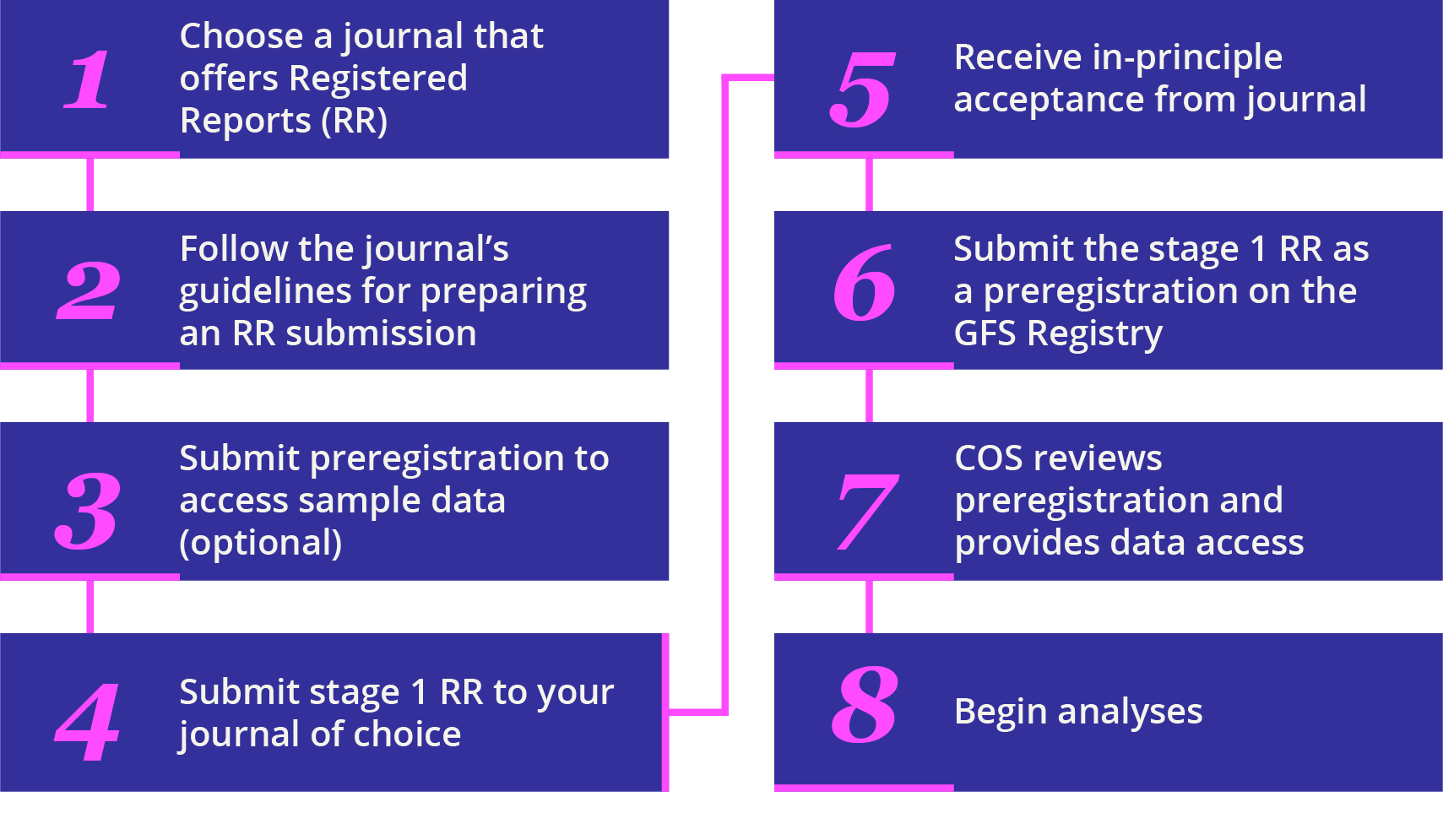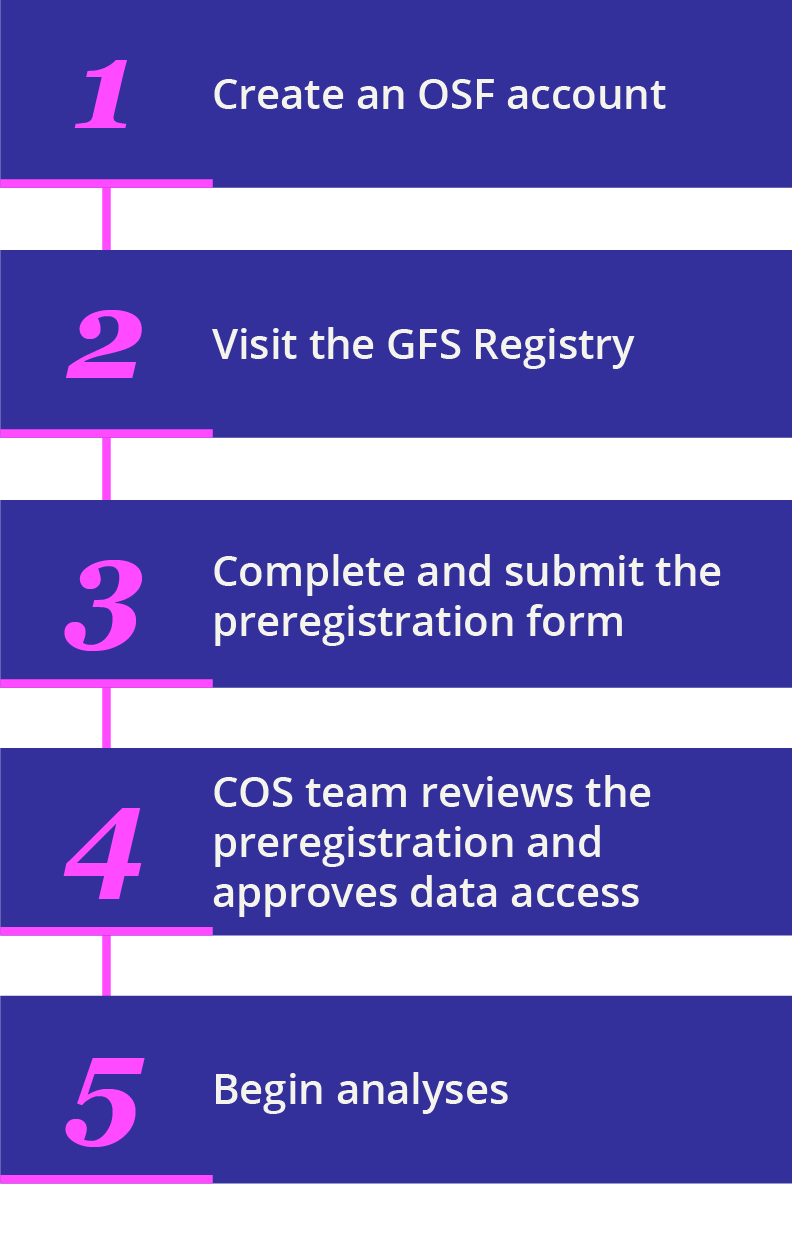Wave 1, mid-year 2024, and wave 2 data are available to everyone completing a preregistration via the Open Science Framework (OSF).
The Wave 1, mid-year 2024, and wave 2 data will be publicly released without preregistration in Spring 2026. After public release, there will be no restrictions on use with the exception of sensitive data which will continue to require ethical approval (e.g. an Institutional Review Board (IRB) prior to data access. You are still welcome and encouraged to preregister your study and analysis plan even when the data are publicly released.
There are three ways to access the data with the first early access date in the coming months and access without registration about one year later.
Registered Reports is a publishing model in which the journal reviews the preregistration plan and provides an in-principle acceptance (IPA) to publishing the findings regardless of outcome to protect against publication bias. This model is ideal for researchers who have a hypothesis-driven study in mind. Use the Codebook (Wave 1, Mid-Year, and Wave 2), Sample Dataset, Guide to Preregistration, and Preregistration Template to help you build your preregistration to access the sample data. Update your preregistration to request access to the full dataset after you have received IPA.
Preregistration is the creation of an analysis plan before observing the data to improve the credibility of statistical inferences and to clarify the distinction between planned tests and unplanned discoveries. Use the Codebook (Wave 1, Mid-Year, and Wave 2), Guide to Preregistration, and Preregistration Template to help you build your preregistration.
For descriptive, non-academic uses, data journalists, policymakers, and others may obtain access during the controlled access period if they meet a qualified use case of descriptive reporting for non-academic purposes. Please email your request directly to globalflourishing@cos.io.
The Wave 1, mid-year 2024 and Wave 2 non-sensitive data will be publicly released without preregistration in Spring 2026. After public release, there will be no restrictions on use with the exception of sensitive data which will continue to require ethical approval (e.g. an Institutional Review Board (IRB)) prior to data access. You are still welcome and encouraged to preregister your study and analysis plan even when the data are publicly released.
Researchers requesting access to the GFS data agree to keep the data private until it is made publicly available, document analyses that are unplanned or changed from the preregistration, report outcomes, share code and materials, and make findings openly accessible. Learn more about the data request agreements.
Registered Reports is a publishing format that emphasizes the importance of the research question and the quality of methodology by conducting peer review prior to observing the data. Registered Reports offers an opportunity for researchers to receive expert feedback on their study design before accessing the data. In the Registered Reports model, journals provide an in-principle acceptance to publish a study prior to data access and observation. The study will be published if it was conducted as planned, regardless of what the results show. This supports researchers by providing critical review when the feedback can more easily guide the direction of the study, and reduces publication bias by ensuring that all results are reported regardless of their support for the hypothesis. Given that the full GFS data will not be available for some months, researchers have a window of several months to start approaching journals, thus accelerating the timeline to publication since the peer review will have occurred during the waiting period before data are released.

To access the data from the GFS, first create an Open Science Framework (OSF) account, which you can do here. Then, visit the GFS Registry and complete the Preregistration Form for access to the data. See https://osf.io/3jtz8/ for release dates.
After submission of your preregistered study plan, the COS team will review the submission for completeness of the preregistration before access is granted to the dataset.
Preregistration is required to access each wave of data for the first year of release (preregistration for Wave 1 access is two years). Preregistration will create a read-only, time-stamped copy of a research plan completed before the researcher's study is begun. Preregistration carries a number of benefits to researchers and the research community. Not only does it clarify how the data will be used, it will also allow the research community to know what research questions are being pursued, enabling increased collaboration and reduced duplication of efforts. Additionally, it helps clarify the distinction between planned and unplanned research. Preregistering for GFS data access will increase the discoverability of research and will maximize the impact of this valuable dataset.
Access the Guide to Preregistration and Preregistration Template that can be used to draft your research plan. If you would like to learn more about how to conduct a preregistration, click here.
Please note that it is your responsibility to ensure that your email address you register with is kept up to date to receive data and other correspondence about the study.



6218 Georgia Avenue NW, Suite #1, Unit 3189
Washington, DC 20011
Email: contact@cos.io

Unless otherwise noted, this site is licensed under a Creative Commons Attribution 4.0 International (CC BY 4.0) License.
Responsible stewards of your support
COS has earned top recognition from Charity Navigator and Candid (formerly GuideStar) for our financial transparency and accountability to our mission. COS and the OSF were also awarded SOC2 accreditation in 2023 after an independent assessment of our security and procedures by the American Institute of CPAs (AICPA).
We invite all of our sponsors, partners, and members of the community to learn more about how our organization operates, our impact, our financial performance, and our nonprofit status.